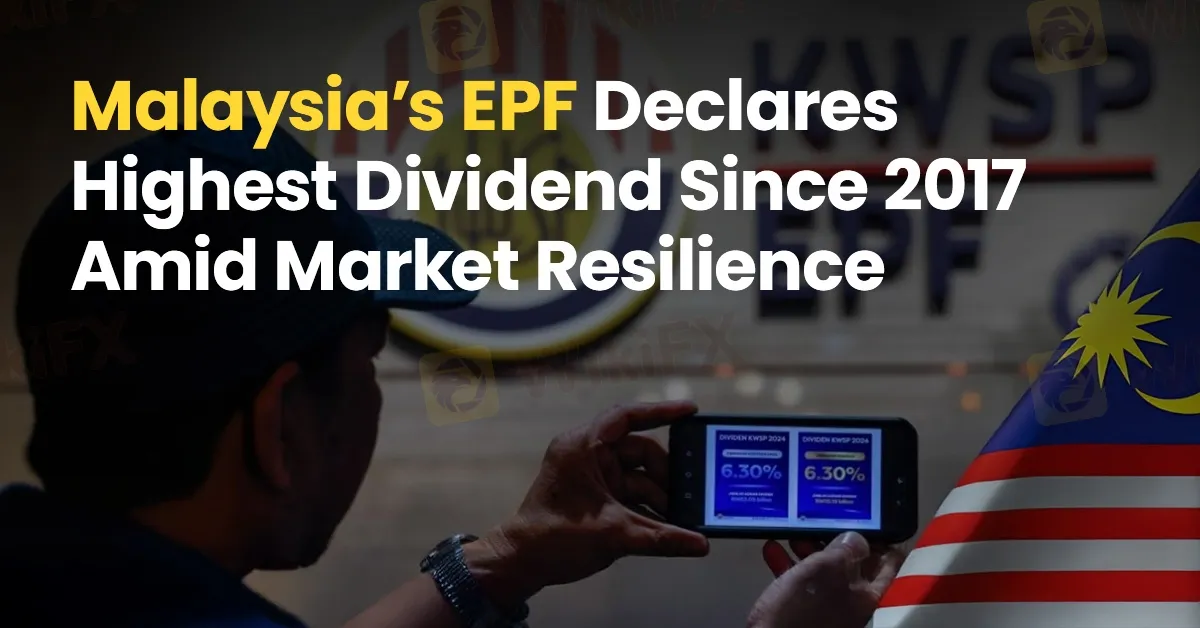简体中文
繁體中文
English
Pусский
日本語
ภาษาไทย
Tiếng Việt
Bahasa Indonesia
Español
हिन्दी
Filippiiniläinen
Français
Deutsch
Português
Türkçe
한국어
العربية
Malaysia’s EPF Declares Highest Dividend Since 2017 Amid Market Resilience
Abstract:Malaysia’s Employees Provident Fund (EPF) has announced a 6.3 per cent dividend for both its conventional and syariah savings accounts for 2024. This marks the fund’s highest payout since 2017 and the first time both accounts have recorded the same rate. The unexpected increase is expected to encourage more voluntary contributions from members.

Malaysia‘s Employees Provident Fund (EPF) has announced a 6.3 per cent dividend for both its conventional and syariah savings accounts for 2024. This marks the fund’s highest payout since 2017 and the first time both accounts have recorded the same rate. The unexpected increase is expected to encourage more voluntary contributions from members.
The total distribution amounts to RM73.2 billion (S$22.2 billion), a sharp rise from the previous years rates of 5.5 per cent for conventional savings and 5.4 per cent for syariah savings. In 2017, the fund declared dividends of 6.9 per cent for conventional accounts and 6.4 per cent for syariah accounts. Historically, syariah account holders have received lower returns compared to their conventional counterparts.
Analysts noted that the 6.3 per cent dividend significantly exceeds Malaysias long-term annual inflation rate of 2.5 per cent, ensuring healthy savings growth. Despite the introduction of “Account 3” as a flexible withdrawal option, only 30 per cent of members under 55 have opted for this, suggesting a preference for long-term savings security.
EPF‘s membership exceeds 16 million, with over 8.8 million actively contributing, making up 51 per cent of Malaysia’s 17.3 million labour force. The active-to-inactive member ratio improved in 2024 to 54:46. Contributions rose 11 per cent to RM108.2 billion, reflecting an expanding member base and rising wages. Employer registrations increased, with 71,471 new companies joining, bringing the total to 614,563.

The strong dividend may boost voluntary contributions, given EPFs risk-free returns. However, concerns remain over depleted savings due to past withdrawal schemes. Experts suggest merging underperforming government-linked investment companies into a “Malaysia Superfund” to address pension challenges and establish a universal basic pension.
EPF has also faced scrutiny over its handling of Malaysia Airports Holdings (MAHB) shares, with lawmakers questioning an alleged RM700 million loss from selling shares at RM6.80 before repurchasing them for RM11. EPF executives were summoned on February 17 to explain the transaction, which led to MAHB‘s delisting on February 25 and involvement from BlackRock’s Global Infrastructure Partners.
The strong dividend performance was attributed to global and domestic market recovery, economic resilience, and sound portfolio management. EPF closed 2024 with an 11 per cent increase in investment income, reaching RM74.5 billion. Investment assets grew 10 per cent year-on-year to RM1.25 trillion.
Foreign investments, comprising just over a third of total assets, accounted for half of total returns. Domestic investments, which make up 63 per cent of the portfolio, delivered a nearly equivalent income share. Despite higher returns from foreign investments, EPF plans to continue prioritising domestic assets, allocating 70 to 80 per cent of new funds locally, in line with its Strategic Asset Allocation plan for 2025 to 2027.
In 2024, EPF deployed RM96.8 billion in new investments, with 82 per cent directed to domestic assets and 18 per cent to international markets. Equities remained the primary income driver, generating RM49.8 billion—two-thirds of total returns. Fixed income investments contributed RM21.9 billion, while real estate and infrastructure investments added RM1.6 billion.

Disclaimer:
The views in this article only represent the author's personal views, and do not constitute investment advice on this platform. This platform does not guarantee the accuracy, completeness and timeliness of the information in the article, and will not be liable for any loss caused by the use of or reliance on the information in the article.
Read more

Trade Journal 2.0: What Experienced Traders Track That Beginners Often Ignore
A Trading Journal is more than a basic record of trades. It’s a learning and improvement tool. Beginners often jot down only price and time. Experienced traders add deeper insight that helps them get better over time. Here's what they track:

Thailand-Cambodia War Pressures Thai Baht in Forex Market
The ongoing conflict between Thailand and Cambodia has put immense pressure on the Thai Baht, impacting the forex market and investor sentiment. Read on for more.

6 Red Flags to Notice Before Investing in Neuron Markets
Investment scams have been rising over the last 5–6 years. Therefore, you need to be alert in the forex market, as many scam brokers are active and waiting to exploit inexperienced investors and traders. Neuron Markets is one such broker that appears genuine and makes big promises but ends up swindling investors’ money. Checkout red Flags and stay Safe

Future of Forex in India: Growth or Global Domination?
Every Trader or Investor in India who wants to invest in the dynamic forex market must read this important article. It explores the future of the forex market in India and answers a common question: Forex market will rise or crash in India ? Checkout the article below.
WikiFX Broker
Latest News
Global week ahead: Crunch time for trade talks as Trump's deadline nears
Top Wall Street analysts recommend these dividend stocks for regular income
Stock futures rise as U.S.-EU trade deal kicks off a hectic week for markets: Live updates
Thailand-Cambodia War Pressures Thai Baht in Forex Market
Samsung Electronics signs $16.5 billion chip-supply contract; shares rise
Does XS.com Hold Leading Forex Regulatory Licenses?
European stocks set to rise after the U.S. and EU strike trade agreement
Elon Musk confirms Tesla has signed a $16.5 billion chip contract with Samsung Electronics
Chile Bumps Up Copper Price Forecast and Flags Lagging Collahuasi Output
Bitget Lists Caldera for Spot Trading | What Should You Know?
Currency Calculator


